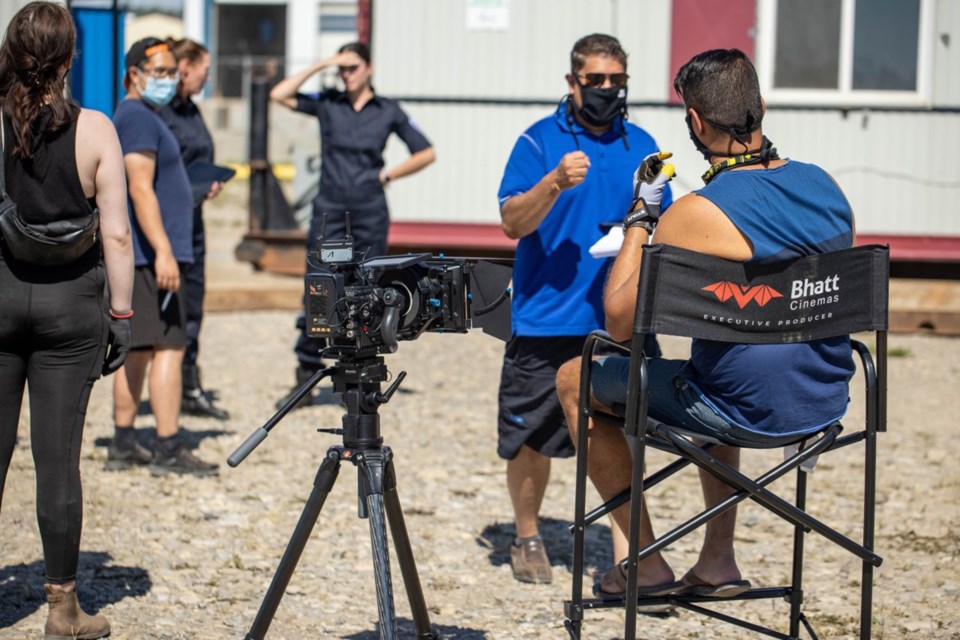SUNDRE — Although filming of the independently-produced pilot episode of Pipe Nation wrapped up last fall with the final edit completed in February, feedback from more experienced industry insiders prompted the director to include one last pivotal scene that he feels will provide crucial context and tie the story together.
“The biggest struggle I had was that we’re fairly alone in the film community here,” Edmonton-based filmmaker Raoul Bhatt explained on March 18 during a phone interview.
“So, I don’t have a lot of people that I can turn to for mentorship,” said Bhatt.
But one of the actors on his show, Nels Lennarson, who plays the role of the story’s villain, was recently involved in the production of a Bruce Willis movie in Vancouver called Cosmic Sin, directed by Edward Drake.
“They said I have an awesome show, but they also gave a lot of feedback,” said Bhatt.
Originally stylizing himself after Quentin Tarantino, who is known to take his time on artistic and complex scenes that end up making for lengthy movies, Bhatt said he realized as a result of the input he received that as a television show producer, he would have to take a different approach. After all, there’s a world of difference between producing a film for theatre, and a show for television, he said.
Movies have more flexibility on longer run times because once people purchase their tickets, they’re prepared to sit down and focus for a couple of hours at the theatre. But at home, viewers are surrounded by distractions — phones, kids and bedtimes, even work, he said, adding that means having to edit TV shows at a faster pace.
“That was a lesson that I didn’t know, and that I learned from these guys in Vancouver. So, we took the show, we re-edited it so it’s tighter, it’s higher paced for TV entertainment rather than for theatre.”
Additionally, the final scene to be shot on March 28 near Edmonton — a protest in front of a staged pipeline — provides context that ties the whole story together and offers the critical “why” behind Pipe Nation, he said.
“Why does the show exist? We needed to be very obvious as to what is the struggle that these energy workers face,” which is to get the job done to provide for their families, he said.
“But we also have the opposition of the environmentalists, the protests, the politics. And that was one piece I didn’t have in the show, which brought everything together.”
The roughly two-and-a-half minute scene also deals with the main antagonist played by Lennarson, a character Bhatt describes as calm, cool, and calculating.
“He’s not a loose cannon, he’s very composed,” he said.
“In any drama series, you have to have something that is about life or death. This guy has the power to influence a lot.”
Bhatt now hopes to submit the pilot episode to streaming giants like Netflix, Amazon, Apple, and HBO by the end of April. That process will determine whether he gets the green light to continue shooting the rest of the series this summer.
“The rest of the show is done,” he said.
“It’s just we have this one scene that we need to take care of.”
Bhatt said he was faced with two options — to submit the show as it was completed in February, or to do it right and put in that extra effort to try and over-deliver for the best chance of success.
Fully cognizant of the ongoing pandemic, Bhatt said the protest scene, which is expected to feature about 100 people, will be filmed under health guidelines including screenings, masks, and distancing between takes.
“It’s a journey. I’m super excited to get this finished,” he said.
“This is going to be our final scene, and then we’re ready to show it around this summer.”
The first cut was an hour and 20 minutes, which was brought down to 34 minutes before the most recent roughly 45 minutes. With the new scene, and the inclusion of previously filmed content, he expects the episode to last about 55 minutes.
“It almost bought us time in a way,” he said about the pandemic.
“But also, COVID delayed a lot of things in post-production,” said Bhatt, adding he couldn’t bring musicians or his editor into one room and therefore had to complete essentially all of the post-production work remotely.
Despite the adversity, he remains optimistic.
Big drama series can run up production costs of around $5,000 per minute, so those are big stakes when there’s the potential to film 10 episodes and perhaps more if there are additional seasons as well, he said.
Although he still intends to screen the pilot episode, specific details as to how remain something of a question mark.
“I can’t fill a theatre,” he said, adding one must be careful when considering the logistics of gathering people during a health crisis.
“But I think with the vaccine rollout, it’s changing and it’s going to get better,” he said.
“I’m excited to get us to the finish line — or the starting line, you could say. Because once we get a deal, that’s a whole other league! Then, we’ll have a whole other adventure ahead of us.”



